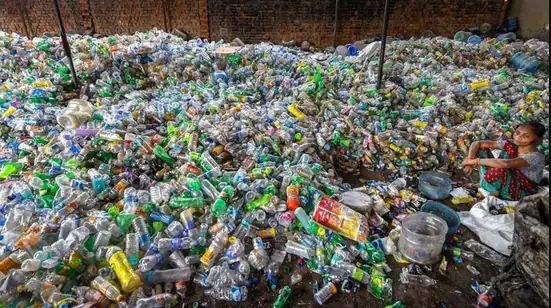India will implement a blanket ban on certain single-use plastic items from July 1 this year, the Central Pollution Control Board has said. The pollution watchdog has issued notices to producers, stockists and e-commerce sites so that these items are no longer used or sold.
“We have issued directions to state pollution control boards, almost all e-commerce websites, single-use plastic sellers and users, central board of indirect taxes and customs, stating that no single-use plastics identified in the notification dated August 12, 2021, should be sold, stocked or used,” a board official said on condition of anonymity. “There have been several meetings and discussions on the implementation of the ban, so we are expecting all stakeholders to comply.”
The prohibited plastic items include ear buds, flags, candy and ice-cream sticks, decorative thermocol, PVC banners less than 100 micron thick, stirrers, wrapping films, cups, glasses, and cutlery, among others.
Additionally, no plastic carry bags less than 120 micron thick can be used from December 31.
Around 43% of plastic is used for packaging and most are single-use, according to a fact sheet released by the environment ministry and the Energy and Resources Institute (TERFI), a think tank. Per capita plastic use in India is about 9.7kg, mostly packaging material, the central pollution body estimates.
If there is no improvement in consumption patterns and waste management practices, there will be around 12 million tonnes of plastic litter in landfills and in the environment by 2050. Single-use plastic contaminates soil and water, chokes waterways and worsen natural disasters.Plastics block sewage systems and provide breeding grounds for mosquitoes, and release toxic chemicals and emissions when burned.
The federal pollution overseer had in July 29 last year directed all state pollution control boards for a quarterly assessment of phasing out of single-use plastic in their jurisdictions, along with details of production capacity and alternatives.
But the information submitted by states was incomplete, according to the latest directions issued earlier this month. The board held a meeting on January 21 with its state counterparts to assess the situation and then prepared an action plan to phase out certain plastic items.
It has directed state boards to revoke or modify consents and registrations issued to producers of single-use plastics to ensure they have zero inventory by July 1. The state pollution boards will also have to direct raw material manufacturers to stop supply and e-commerce companies to discontinue selling of banned items.
They will also have to issue public notices in their jurisdictions and issue fresh commercial licenses to major stockists, retailers, sellers, commercial establishments so that they will not stock or use the banned items. States have also been asked to frame local bye laws to levy compensation in line with central guidelines if the ban is violated.
On February 4, the central pollution watchdog issued notices to inform producers of certain single-use plastic products, stockists, retailers, e-commerce companies, shopping malls and others about ensuring zero inventory of prohibited items by June 30.
Packaging 360 is a comprehensive knowledge sharing ecosystem for the Indian packaging industry. Our services include an online content platform to deliver news, insights and case studies; organising conferences seminars and customised training; Providing Bespoke Project Consulting, Market Research and Intelligence.







